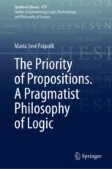Search
Search Results
-
Microtargeting, Dogwhistles, and Deliberative Democracy
‘Dogwhistles’ and microtargeted political advertisements are objects of widespread moral and political concern. With a few notable exceptions in the...
-
A Spoonful of Sugar Makes the Hate Speech Go Down: Sugar-Coating in White Nationalist Recruitment Speech
I argue that popular understandings of white nationalist double speak strategies do not fully represent the practice of these strategies, and...
-
An account of overt intentional dogwhistling
Political communication in modern democratic societies often requires the speaker to address multiple audiences with heterogeneous values, interests...

-
Inferentialist semantics for lexicalized social meanings
This paper offers a general model of the semantics of lexicalized social meanings, i.e. semiotic properties of certain expressions in a...
-
On Media Reports, Politicians, Indirection, and Duplicity
We often say one thing and mean another. This kind of indirection (concerning the content conveyed) is both ubiquitous and widely recognized. Other...
-
Presupposition and Propaganda: A Socially Extended Analysis
Drawing on work from Marina Sbisà’s “Ideology and the Persuasive Use of Presupposition” (1999), Rae Langton has developed a powerful account of the...
-
When Doublespeak Goes Viral: A Speech Act Analysis of Internet Trolling
In this paper I survey a range of trolling behaviors and analyze a particular species that stands out. After a brief discussion of some of the...
-
On the Genealogy and Potential Abuse of Assertoric Norms
After briefly laying out a cultural-evolutionary approach to speech acts (Sects. 1–2), I argue that the notion of commitment at play in assertion and...
-
In Defense of Microtargeting: A Comment on Giles Howdle
This paper critically examines Giles Howdle’s (2023) view that microtargeting of political advertisements is morally problematic, regardless of the...
-
Argumentative Exclusion and the Case of Online Hate Speech
Sometimes we are faced with discussions in which we might think that one or more of our interlocutors should not be partaking in the argument....
-
Dog whistles, covertly coded speech, and the practices that enable them
Dog whistling—speech that seems ordinary but sends a hidden, often derogatory message to a subset of the audience—is troubling not just for our...
-
The hard proxy problem: proxies aren’t intentional; they’re intentional
This paper concerns the proxy problem: often machine learning programs utilize seemingly innocuous features as proxies for socially-sensitive...
-
Pragmatism and Metaphysics: The General Background
In this introductory chapter, I set out the background against which the theses and arguments of the rest of this book must be understood. I explain...
-
Adversarial Listening in Argumentation
Adversariality in argumentation is typically theorized as inhering in, and applying to, the interactional roles of proponent and opponent that...
-
Deflating the functional turn in conceptual engineering
Conceptual engineers have recently turned to the notion of conceptual functions to do a variety of explanatory work. Functions are supposed to...
-
Is that a Threat?
I introduce game-theoretic models for threats to the discussion of threats in speech act theory. I first distinguish three categories of verbal...

